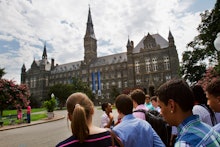Georgetown says it's atoning for its slave-trading past — students say it's just a start

Georgetown University isn't the only college in the United States that was built on the backs of slaves, but on Thursday, it took unprecedented steps to address its history head on.
In a speech to students and staff, President John J. DeGioia announced a set of measures that the school will take to rectify its past misdeeds — including erecting both a public memorial and a new institute for the study of slavery, in addition to offering preferential admissions status to the descendants of the slaves the university once profited off of.
But for the activists and students that have waited years for the university to address its dark past, the announcement didn't mark the resolution to the problem as much as a tepid first step.
It started in 1838 with a slave auction — one hosted by the university's founders. That year, the school's Jesuit founders saw 272 black bodies sold in exchange for money that went toward Georgetown's looming debts.
As the New York Times reports, the amount of money attached to that one sale alone translates to $3.3 million in today's dollars.
A report submitted by the Working Group on Slavery, Memory and Reconciliation, a coalition formed by the university to create a list of next steps it could take, recommended that Georgetown create a scholarship or financial aid package to ease the financial burden of descendants.
Though many of the other suggestions were adopted, including changing the names of two buildings named for the Jesuit presidents who orchestrated the auction, the financial aid recommendation was not addressed.
The university did not immediately respond to a request for comment on why it chose not to implement the financial aid recommendation.
Students say it's time for the school to put its money where its mouth is. Victoria Efetevbia, the president of the school's NAACP chapter and a member of the Provost Committee for Diversity, said that while she was happy that the university will offer preferential admissions status to the descendants of slaves, more could be done to ease their financial burden.
"When can we get to a place where these students can ultimately get free admission, or virtually free admission?" Efetevbia, now a senior at Georgetown, said in an interview.
"If we want to be real about this, Georgetown University is in debt to these descendants," she continued. "They owe them, financially. So I think that they should definitely commit themselves to helping these descendants be able to attend college without any debt, and without any issue."
"If we want to be real about this, Georgetown University is in debt to these descendants. They owe them, financially."
Ayodele Aruleba, a senior studying government, said that while the offer of a preferential admissions status sets up a model that other universities with links to slavery could implement, it doesn't begin to address one of the larger issues born from slavery: educational inequality.
"I think that if we look at education inequality in this country, people of color in schools and neighborhoods of color may not have the resources requisite to prepare students to attend Georgetown University," he said Friday.
"Georgetown has some [programs], but really reinvesting and doubling down on those could really help eliminate educational inequality in this country."
Aruleba, who was a member of the Working Group, said he would celebrate when he saw the results of DeGioia's announcement on campus.
"It's something that I'm happy with, but that's only conditional upon whether or not these things actually happen," Aruleba said. "So I'll be happy when I start to see things change, and the university starts to commit the resources it intended to commit."